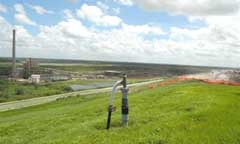|
|
|
Waste Management |
Waste Management and Utilization
Waste materials such as methane from landfills or biomass debris can be utilized for energy generation. The William “Bill” Hinkley Center for Solid & Hazardous Waste Management at UF is a statewide Type I research center created by the Florida Legislature in 1988. The Center functions as a statewide academic research institution, addressing critical environmental issues associated with solid and hazardous wastes. This research center is the largest solid waste research group in the United States. In its 18-year history, the Center has funded more than 120 research projects, providing funding for more than 130 masters and doctoral students.
Primary research areas include: Construction and Demolition Debris, Hazardous Waste Management, Incineration, Landfills, Medical Waste Management, Municipal Solid Waste Management, Pollution Prevention, Recycling and Reuse, Socioeconomic Issues, Special Wastes, and Waste Reduction
Gases generated from the natural decomposition of wastes in landfills (methane and carbon dioxide) contribute to global warming if allowed to escape into the atmosphere. To reduce the amount of atmospheric methane emissions from a landfill, energy is often wasted (as heat) through the use of flares that convert the methane to carbon dioxide and water vapor. Modular electrical generation systems are used at some landfills to harness this wasted energy.
 |
|
A gas extraction well at the Polk County Bioreactor in Florida |
The disposal of waste treated wood which contains arsenic, chromium, and copper (CCA treated) is a huge environmental challenge in a state where docks, boardwalks, and playground equipment are being taken out of service on a large scale. Suitably designed waste-to-energy (WTE) systems have the potential to convert this waste material into energy and efficiently recover the toxic metals.
Some of the goals are:
- Develop a process in which waste treated wood can be converted into liquid transportation fuels
- Develop methodologies which enable landfill gas to be used in fuel cell applications to generate electrical power.
The Center serves the citizens of Florida by providing leadership in the field of waste management research and by supporting the Florida Department of Environmental Protection in its mission to preserve and protect the state's natural resources.
In addition UF has a program to develop solar powered small scale biogasification
system for treating household wastes.




